|
Wolverhampton has been home to
many well-known and well-respected businesses, whose
products became a household name. One of the longest running
of them was Reade Brothers and Company, manufacturing
chemists, whose patent powders, pills, creams, and medicines
were a source of comfort and relief from pain for many
generations.
The business began in the late
eighteenth century, at a time when medicine was in its
infancy, and visits to the doctor could only be afforded by
wealthier members of society. The firm can trace its roots
back to Mander, Weaver, and Company, founded by John Mander
in 1773. He started his business in King Street, and soon
moved to the eastern side of Victoria Street (then called
Cock Street), roughly opposite where Beatties stands today.
|
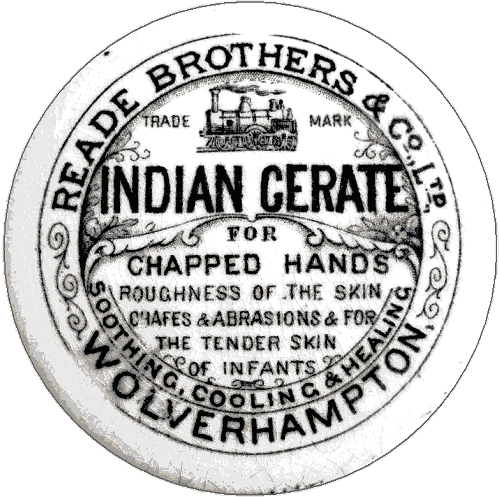 |
His premises had a large frontage, and
a small factory at the back. He manufactured chemicals for
sale at home and abroad, including mercurial preparations
such as calomel, which were sold for medicinal purposes.
He
was joined in the business by Mr. Bacon, a wealthy
businessman, and the firm began trading as Mander and Bacon.
Several years later John Weaver joined the business and it
became Mander, Bacon and Weaver. John Weaver was a talented
and energetic businessman who worked hard to increase sales.
A little later, John Mander and Mr.
Bacon retired. Benjamin Parton Mander became a partner, and
the firm traded as Mander, Weaver and Mander. |
| Around 1833
Mr. Mander retired, and John Weaver carried-on alone,
trading as Mander, Weaver and Company. After John Weaver’s
death in 1849 his son Frederick took over, and ran the
business until 1873 when it was taken over by Thomas Reade
and his brother William. |
| The two Reade brothers, then in their
mid thirties, had been in business for fourteen years at a
shop in High Street, Wolverhampton. William specialised in
the production of varnishes, and Thomas specialised in the
production of patent medicines. The firm’s early medical
treatments included Egyptian Salve, which became a popular
ointment for ulcers, abscesses, burns, scalds, bad legs,
gathered breasts, inflamed eyes, erysipelas, eruptions, and
skin diseases. It was available in pots of three sizes,
selling for 1s.1½d., 2s.9d., and 4s.6d. |
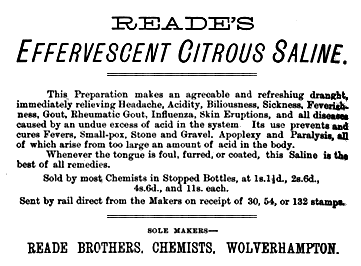 |
|
After the move to Victoria Street, the
business went from strength to strength, and became so
successful that within a few years the small factory behind
the shop could not cope with the demand for the products. In
order to satisfy the demand, the brothers acquired a shop
with a small factory behind, across the road, near to the
Giffard Arms. The shop became a retail chemist’s, and sales
continued to grow.
The business was starting to become
well known for its innovative products. Reade Brothers
received an Honorable Mention for creative chemistry at the
1878 World’s Fair in Paris.
In 1879 the partnership between the two
brothers ended. William decided to leave the business in
order to concentrate on varnish production, and so Thomas
ran the company alone. The following notice appeared in the
February 7th, 1879 edition of the London Gazette: |
|
Notice is hereby given that the
partnership heretofore subsisting between us the
undersigned, William James Reade and Thomas Reade, both of
Wolverhampton, in the county of Stafford, varnish
manufacturers, wholesale druggists, and manufacturing
chemists, trading under the firm of Reade Brothers, at
Wolverhampton aforesaid, was this day dissolved, as from the
29th day of June 1878, by mutual consent. And that the
business of a varnish manufacturer will in future be carried
on by the said William James Reade, on his own account, at
Monmore Green, Wolverhampton aforesaid, who will receive all
debts owing to the said late partnership in respect of the
said varnish business, since the said 29th day of June,
1878, and will pay all claims due from the said late
partnership in respect of the said varnish business, which
have been incurred since that date.
And that the business of a wholesale
and retail druggist and manufacturing chemist will in future
be carried on by the said Thomas Reade, on his own account,
at Victoria Street, Wolverhampton aforesaid, who will
receive all debts owing to the said late partnership in
respect of the said wholesale druggist and manufacturing
chemist business, since the said 29th day of June, 1878, and
will pay all claims due from the said late partnership in
respect of the said wholesale druggist and manufacturing
chemist business which have been incurred since that date.
As witness the hands of the said
William James Reade and Thomas Reade, this
4th day of February, 1879.
William James Reade.
Thomas Reade
|
|
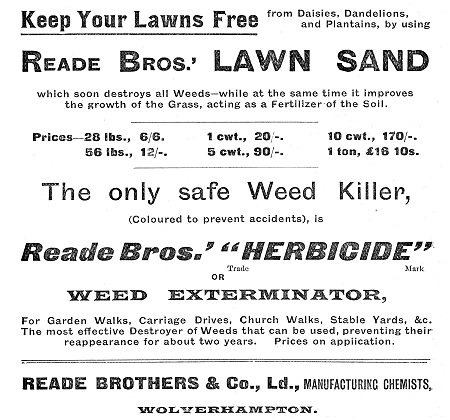 |
On 1st December, 1893, Thomas Reade
bought the large building in Cleveland Road, opposite the
hospital, now known as the Dixon’s building. He purchased it
from carriage maker Forder and Company Limited, which was
having financial problems.
In the following year Reade
Brothers and Company, Limited was formed, and the company
moved into the Cleveland Road building.
Although the firm’s manufacturing activities were
soon concentrated in Cleveland Road, Reade’s were not the
sole occupants of the building. The basement had been leased
to the Staffordshire Brewery in 1890 for five years,
and Forders continued to use part of the building for some
time. |
|
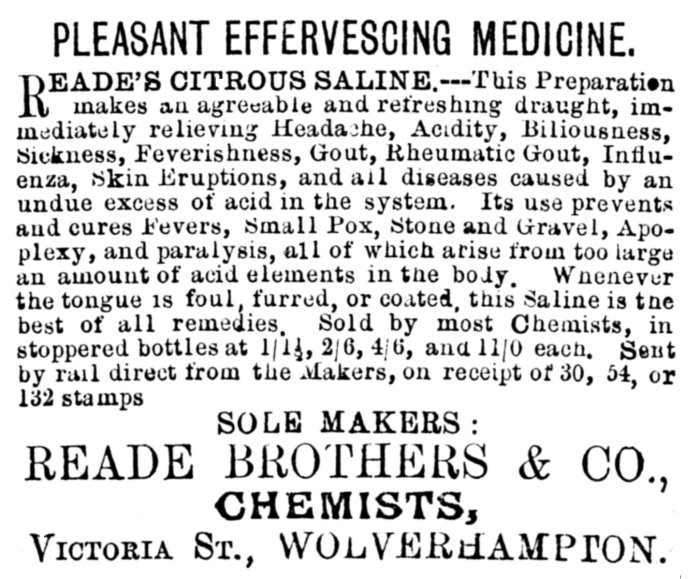
An advert from the 1880s.
|
|
 |
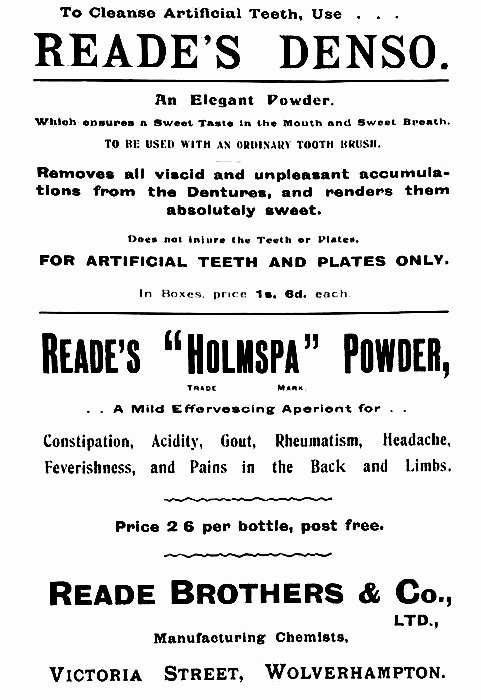
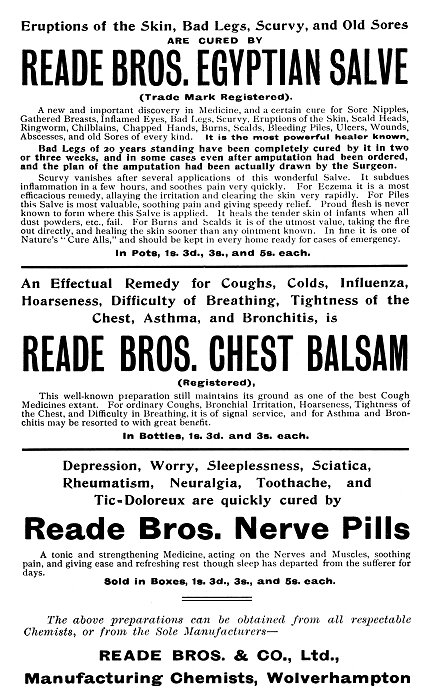
An advert from 1916.
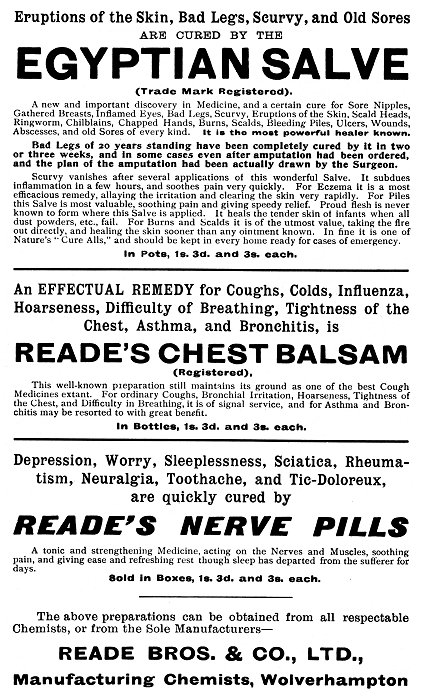
An advert from 1917.
|
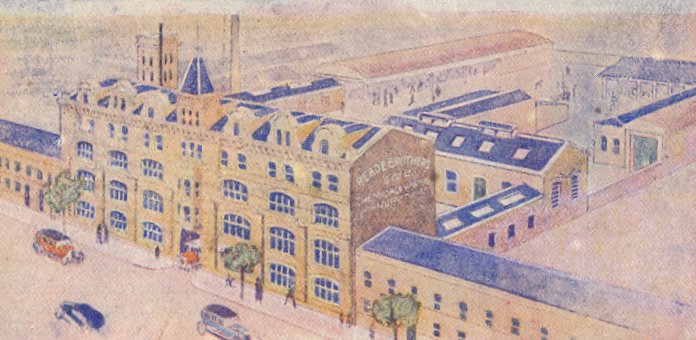
The Cleveland Road promises in the
1930s. |
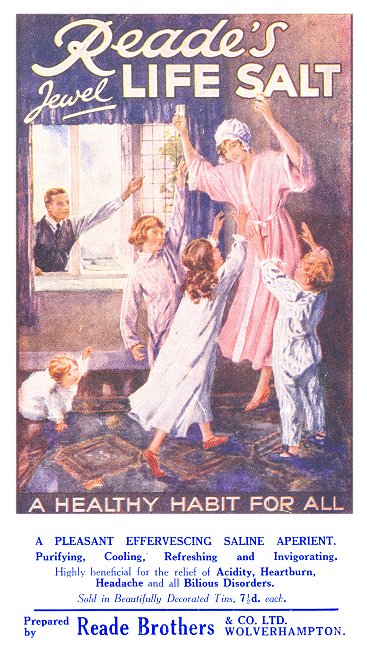
An advert from 1933.
|
In November 1900 Thomas Reade was
elected as a member of the Wolverhampton School Board. After
its dissolution in July 1903, he was elected as a member of
Wolverhampton Council.
In 1903 Thomas was joined in the
business by his two sons. The younger of them, Charles James
Reade had a good head for commercial matters and was
destined to run the business in later years. In 1908 the
Cleveland Road building was passed by conveyance to Reade
Brothers.
The firm continued to produce a range
of chemical products until 1919, when Charles was taking
over more of his father’s duties, and shaping the firm’s
future.
|
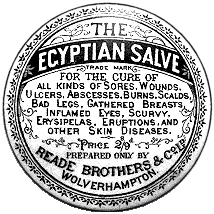 |
|

Thomas Reade, one of the founders. |
By this
time Thomas was seventy four years old, and relied more and
more on his son’s abilities. Charles sold the Victoria
Street premises, so that the business operated solely in
Cleveland Road. At the same time production of the chemical
products ended. A few of the firm’s better known
medicines which sold as remedies for all kinds of ailments,
were as follows:
Indian Cerate, an all-purpose skin
ointment which became extremely popular. Although other
manufacturers marketed it as a clear jelly, Charles found a
way of producing it as a pure white cream which was more
effective, and more attractive to use.
Express Powders, a safe and sure remedy
for headache, influenza, feverishness, and rheumatism, were
introduced in 1913.
Chest Balsam, one of the firm’s popular
ointments was introduced in 1911.
Surgical Boric Lint, a safe and
reliable antiseptic dressing for application to wounds,
abrasions, sores etc.
Medicinal Liquid Paraffin
(exceptionally pure). Used internally for habitual
constipation.
Effervescence Citreous Saline.
|
|
Other products included a bug
destroyer, insect powders, disinfecting liquid, and garden
fertilisers. Many product labels carried a trademark
consisting of an old steam railway engine because Thomas was
a railway enthusiast.
As Thomas grew older, Charles took-on
more responsibilities, and was running the firm by the late
1920s. In 1930 Thomas finally retired at the age of eighty
five, and Charles became Managing Director. At the time he
was an extremely fit and energetic forty seven year old, who
in his youth had been a passionate sportsman. He now
concentrated his energy on developing the firm, and ensuring
that it had a good future. Sadly Thomas’s retirement was
brief, he died in 1931 at the age of eighty six.
|
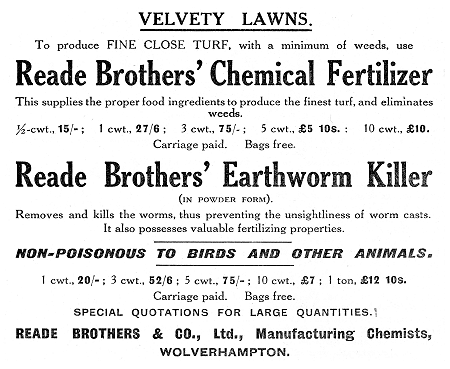 |
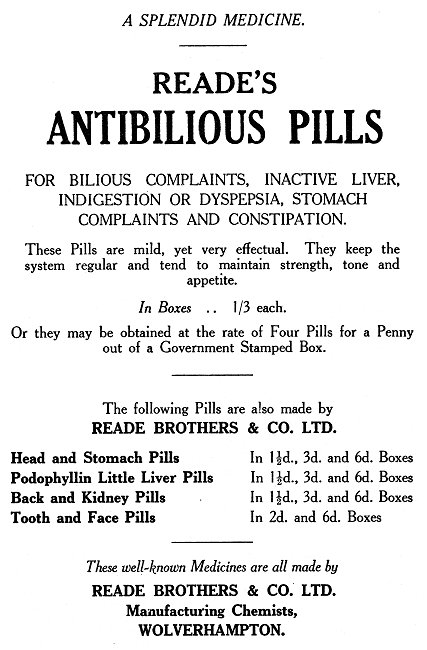
An advert from 1933.
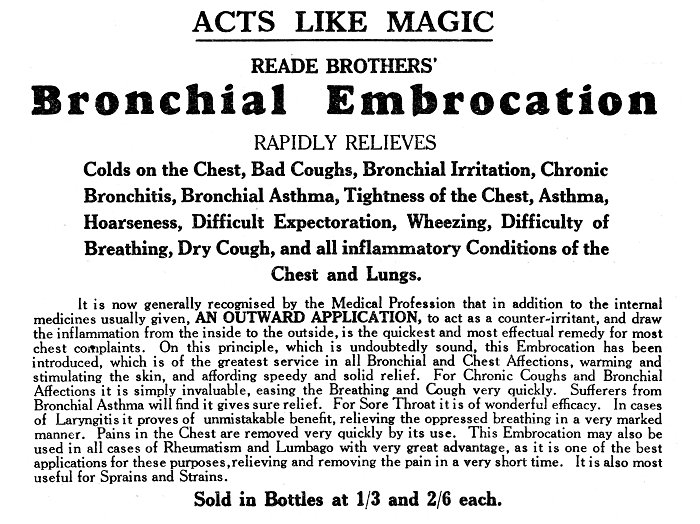
An advert from 1933.
 |
|
 |
|
Charles
Reade. |
|
Derek Reade. |
|
|
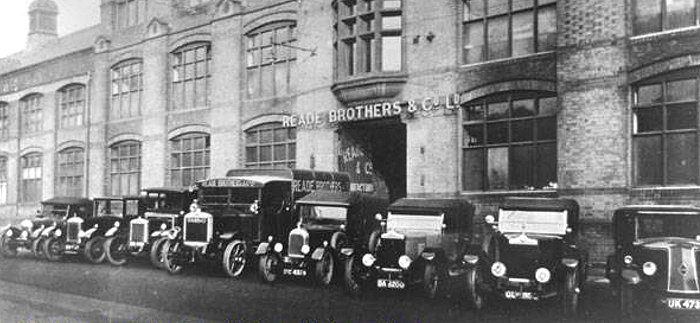
An old view of the Cleveland Road
premises. Courtesy of Brian Reade. |
|
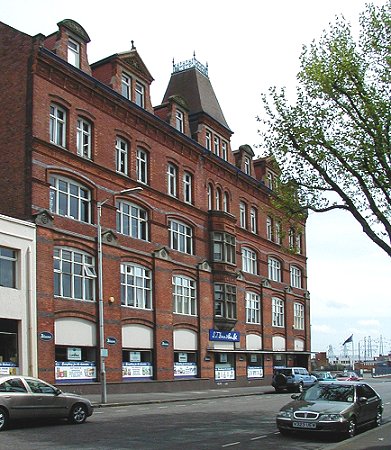
The Cleveland Road premises. As seen
in 2002. |
Luckily the younger generations of the family would continue
to play their part in the family business. In 1933 Charles’
son Derek, who was twenty one years old, became a
joint-partner in the firm with his father.
The range of proprietary
medicines greatly increased, including many of the old
favourites such as Reade’s Express Powders, Egyptian Salve,
and Indian Cerate.
There were also many new preparations including
cough mixture, embrocation, liniments, health salts, toilet
preparation, brilliantines, medicated confectionary such as
Vapomenth, pastilles, linseed liquorice, and chlor lozenges.
Other products included
food flavourings, gravy colouring, fruit drinks, and also household polishes, household ammonia,
insect powders, and disinfecting fluids. |
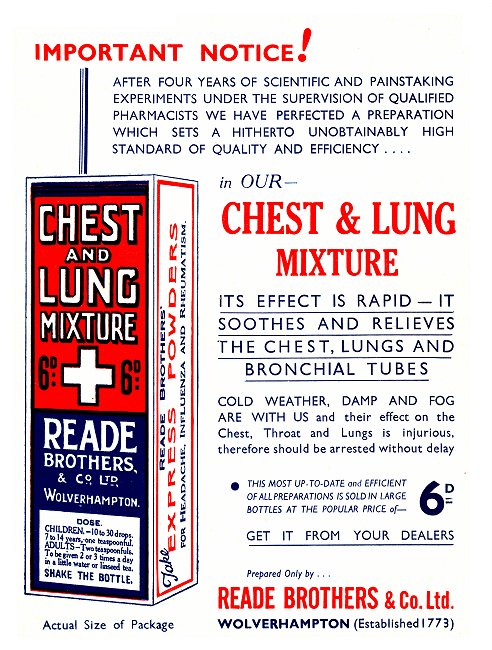
An advert from 1933.
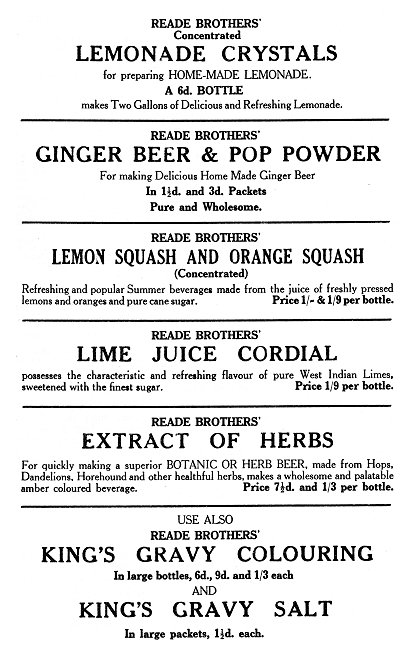
An advert from 1933.
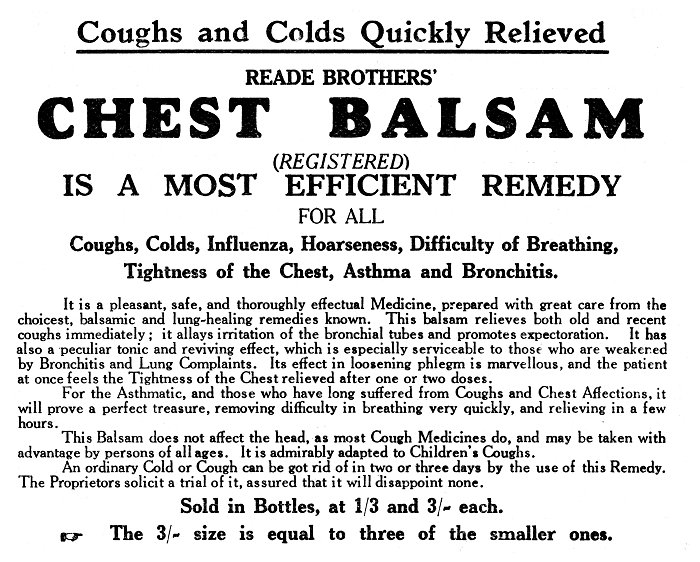
An advert from 1933.
| The introduction of the National Health Service in 1948
greatly changed the patent medicine industry, and eventually
led to a decline in sales. The industry was soon dominated
by large drug companies, who could spend vast amounts of
money on research to develop ever-complex and expensive
drugs.
Reade Brothers hoped to survive by concentrating on
less serious illnesses and ailments, the sort of thing which
would be considered to be too trivial for a visit to the
doctor. |
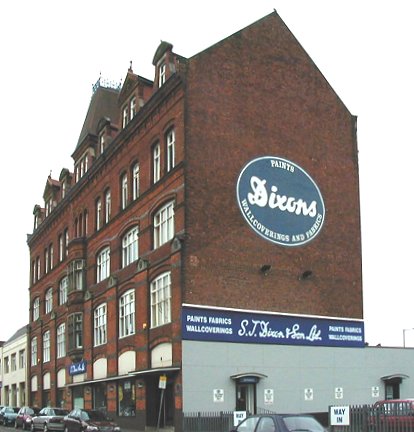
Another view of the Cleveland Road
premises. |
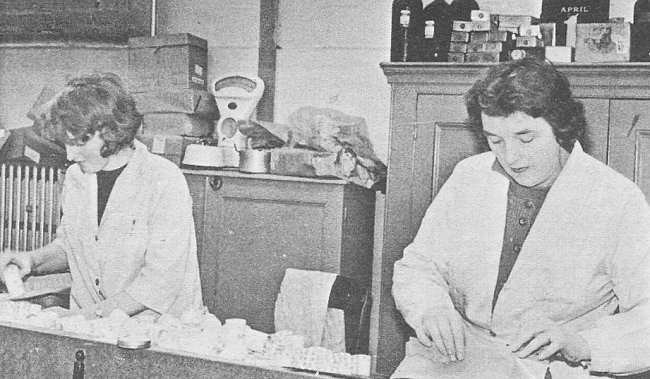
Wrapping Reade's Express Powders.
|
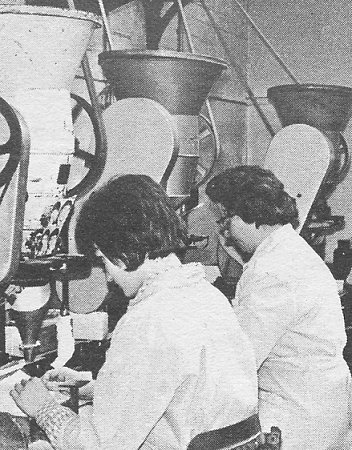
The packing bench. |
The firm decided to sell the Cleveland Road premises and
move into a smaller building in nearby Sharrocks Street.
In
1959 the Cleveland Road building and the adjoining houses,
also owned by the company, were put-up for sale. They were
acquired by S. J. Dixon & Son Limited in September 1960.
Charles James Reade died on 1st January 1965, leaving three
directors on the board. They were his son Derek Reade, his
cousin Mr. T. B. Reade, and Mr. J. L. Scott, an experienced
chemist who was in charge of research and development.
By
this time the company had eighteen employees in the Sharrocks Street factory, continuing to produce their
long-surviving range of remedies, and toilet preparations.
The factory contained modern machinery and had first-class
laboratory facilities. |
| Reade Brothers continued producing patent medicines at
Sharrocks Street until their chemist, Mr. J. L. Scott, retired
in 1972, and production
came to an end.
The firm had been producing patent medicines
for over two hundred years, and must have been one of the
longest-running companies of its kind. |
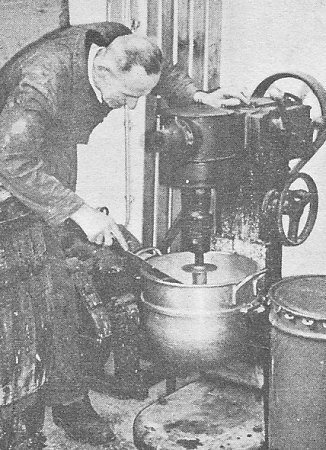
Mixing hand cream. |
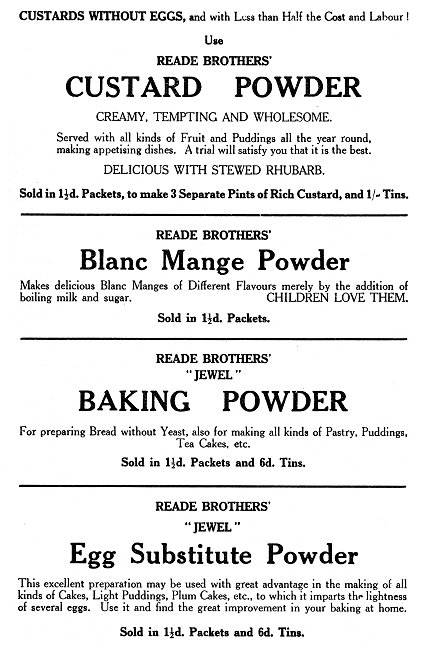
An advert from 1933.
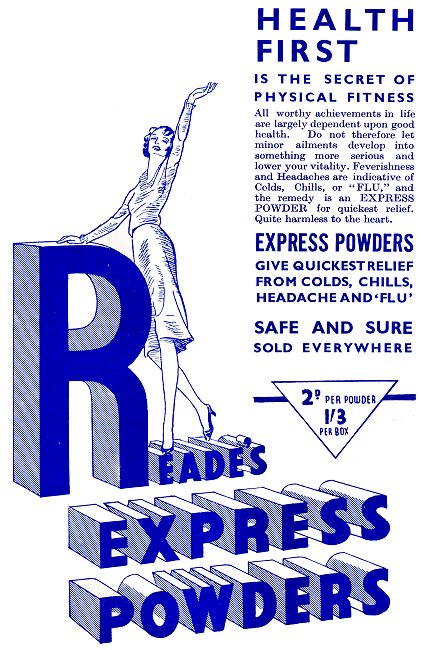
An advert from 1933.
 |
Return to
the
previous page |
|